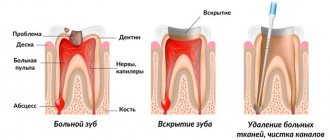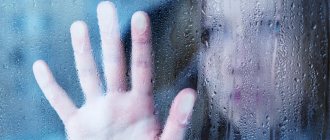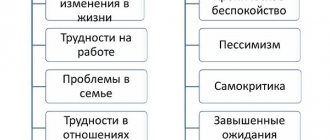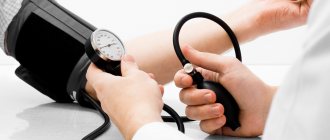Neurological problems often occur in school-age children. However, often complaints of frequent headaches in adolescents, back and neck pain, and irritability remain underestimated. And this applies not only to the perception of the problem by parents, but also by specialists. Even doctors often perceive malaise and headaches in teenagers as “shirking from studying,” laziness, or the like.
It is important to understand that a growing organism has a good ability to adapt. But increased psycho-emotional and mental stress, poor diet, lack of sleep and rest easily lead to disruption of the child’s adaptive capabilities. Often this is what causes various disturbances in the functioning of the body, which can manifest themselves as a variety of neurological and other somatic diseases. The causes of headaches in adolescents often lie precisely in the increased psycho-emotional and physical impact on the young body.
What is irritability?
Irritability is a condition in which a person normally
reacts excessively and inappropriately to stimuli. A man or a woman, a guy, a girl, a boy, a girl, an adult, a teenager, a child experiences increased irritability , severe irritability . Often with irritability, nervousness, anger, hot temper, cholericism, pickiness, twitchiness, neurasthenicity, and hyperesthenia are observed.
Causes of irritability
What causes irritability? The causes of irritability are varied. The excitable type of nervous system (choleric, choleric) is a predisposing factor for the development of irritable conditions. Exhaustion of the nervous system, neurosis, neurasthenia, epilepsy, depression, anxiety, fatigue, fatigue, chronic fatigue, asthenia, anger, nervousness, headache, somatic diseases, post-stress conditions, stress, overwork, increased mental, mental, physical, contribute to the occurrence of irritability. emotional stress, emotional burnout syndrome, difficult life situations, conflicts in the family and at work, divorce, death of relatives.
Causes of cruelty and aggressive behavior in adolescents
Consequences of organic damage to the nervous system due to injuries, oxygen starvation (hypoxia), operations, infections and poisoning. Encephalopathy. Hypertension-hydrocephalic syndrome (hydrocephalus).
- Pathologically occurring pubertal crisis. Hormonal changes lead to overexcitation of the nervous system.
- Personality disorders (psychopathy).
- Endogenous diseases: depression, bipolar affective disorder, schizoaffective disorders, schizotypal disorder, schizophrenia.
- Eating disorders (anorexia, bulimia).
Inharmonious relationships in the family, conflicts between parents, mental disorders in family members can also be factors that cause stress on the adolescent’s psyche, contributing to aggressive behavior.
For psychiatrists, character changes during adolescence are of great diagnostic importance.
In the case of the norm, changes in the type of sharpening of personality traits are observed. This is when character traits that have been observed for many years seem to be hypertrophied. The uncommunicative becomes withdrawn. Impatient - unrestrained. Pugnacious - aggressive. As a rule, in such cases, upon completion of the period of hormonal changes, the condition levels out.
Particular attention should be paid to sudden changes in the teenager’s behavior. If before this the child was flexible, good-natured and non-conflicting, and in a short time he changed beyond recognition and became “cold-blooded”, unemotional and ruthless, this signals painful changes in the psyche. Need a doctor!
Symptoms, signs, manifestations of irritability
What are the symptoms of irritability ? If a person experiences aggression, anger, or inappropriate reactions towards surrounding people or events, then this is a reason to contact a specialist at the clinic of neurology and rehabilitation of the nervous system. Don’t wait for depression, anxiety, increased irritability, fatigue, nervousness, headache, weakness, drowsiness, tearfulness, apathy, nausea, fatigue, insomnia, anger to appear. Reactions of the autonomic nervous system may appear, such as increased sweating of the hands, palms, armpits, a feeling of numbness in the arms and legs, fingertips (goosebumps), and sensory disturbances.
Causes of headaches in teenagers
The primary causes of headaches in adolescents are numerous and varied. However, some factors play a more significant role than others:
- headaches in a teenager can be caused by emotional tension, which is a manifestation of anxiety or stress;
- The causes of headaches in a teenager may be hidden in physical tension in the muscles of the head and neck: incorrect body position when working at the computer or doing homework, in the absence of proper physical activity;
- Frequent headaches in adolescents may be a manifestation of vascular dystonia against the background of autonomic dysfunction
- undiagnosed decrease in visual acuity and incorrectly selected glasses are also often listed as causes of headaches in adolescents and children.
- undetected foci of chronic infection (chronic sinusitis, adenoiditis) can provoke chronic asthenic syndrome. As a result, feelings of tiredness, increased fatigue and frequent headaches may appear in adolescents.
I would like to note that primary headaches in a teenager themselves do not directly threaten the child’s life, but in the absence of proper treatment and in the absence of understanding of the causative factors, they lead to chronicization (increasing frequency) of the process. And this significantly disrupts the child’s usual daily activities, contributes to school absence, decreased academic performance and social activity.
Thus, headaches in a teenager, increased fatigue, sleep disturbances, anxiety, decreased performance at school, back and neck pain are often interrelated. All these symptoms may be a sign of psycho-emotional stress. If a child complains, then he needs a good neurologist for a teenager. You shouldn’t ignore and chalk everything up to “adolescence.” Treatment of headaches in adolescents is mandatory, otherwise the process may cause more serious problems.
The 7 Doctors Clinic operates a center for pediatric neurology. We employ professional and experienced neurologists for adolescents. We are ready to offer a comprehensive screening program for children and adolescents, which includes:
- initial examination by a neurologist;
- examination of specialists in related specialties (ophthalmologist, otolaryngologist, psychologist) to exclude concomitant pathologies and identify the cause of headaches in adolescents and other neurological disorders;
- performing the necessary diagnostic measures;
- treatment of headaches in adolescents and other pathologies using non-drug methods and with the help of medications.
If you need a good neurologist for a teenager and are looking for the best headache treatment clinic, contact the medical one. Our professional doctors will definitely help you and your child.
How to get rid of irritability?
How to get rid of irritability quickly, easily, in a short time? The most effective way to get rid of irritability is to consult a specialist. The doctor will develop an effective plan to combat irritability, select special treatment, and prescribe procedures that will restore the condition of the patient’s nervous system and remove irritability and nervousness. We know how to get rid of irritability in a short time. Don’t forget to rest more, play sports, exercise, do fitness, take preventive courses of treatment to strengthen the nervous system, and look for the root of your problems in psychology.
Irritability and depression, anxiety, fatigue, nervousness
Often in modern society people forget about their own health. Constant pressure at work, consumer society, stereotypes force people to work a lot and take little care of their health. People don't take care of themselves. And what is the result? Severe increased irritability , constant depression, high tearfulness, fatigue, internal anxiety, excessive drowsiness, fatigue, nervousness, excessive anger and malice, nausea and insomnia, very strong apathy, and aggression occur.
What happens to the psyche during adolescence
During the period from an average of 10 to 18 years, the development of internal organs and systems acquires qualitative changes, hormonal changes begin, new social instincts begin to appear, and sexual behavior is formed. All this is reflected in the mental sphere. Almost all mental functions change.
Attention to things that were previously uninteresting increases. The load on the emotional and volitional sphere increases, which makes it increasingly difficult to restrain and adapt. Thinking and personal characteristics change. This contributes to such adolescent behavior characteristics as:
- protest reactions,
- attracting attention to oneself,
- realization of energy unspent in a normal way,
- intolerance.
Irritability in women, female irritability, female irritability syndrome
Greater high irritability in women is often associated with diseases and conditions such as PMS (premenstrual syndrome), before menstruation, during menstruation, after menstruation, during conception, after unsuccessful sex, in early and late pregnancy, before childbirth, after childbirth , during menopause, influenced by neurosis, neurasthenia, vegetative vascular dystonia, ovarian dysfunction, changes in hormonal balance, diseases of the endocrine system, frigidity, anorgasmia (lack of orgasm during sexual intercourse), vaginismus, psychopathy, depression, loneliness, worries, fear, anxiety, pregnancy , irregular periods, anorexia, obesity, thyroid disease, insomnia, state after sleep, fatigue in the morning, in the evening, during the day, during the night, in the morning, in the morning, during the day, in the evening, at night, to sounds, cellulite, saggy breast, mania, cystitis, STIs. Irritability is also a sign of pregnancy. About a week before their period, many women become inadequate, irritable, make incomprehensible demands on men, and create scandals and hysterics. Sometimes, when there is no sexual release, the tension in the female nervous system also increases inappropriately. What should men do? Love and tolerate your women. What if you can’t bear it anymore? Contact the private medical practice Sarklinik, we will help restore the inner peace of your friend, wife, woman, girlfriend.
Irritability in children, childhood irritability, child irritability syndrome, whims
Frequent irritability in children is associated with such various conditions and diseases as the consequences of birth injuries, perinatal encephalopathy, intrauterine hypoxia (lack of oxygen), conflicts in the family, divorce of parents, insufficient attention of the mother or father to the child, excessive care by the grandmother, cruel methods of education, being in an orphanage, difficult adaptation in kindergarten, school, conflicts with children in kindergarten, school, gymnasium, lyceum, childhood neurosis, stuttering, enuresis, tics, Tourette's disease, minimal brain dysfunction (MMD), childhood depression, childhood nervousness , intracranial hypertension syndrome, headache, cerebrasthenic syndrome, weakness, motor disinhibition syndrome, hyperactive child. Whims, aggressive behavior, anxiety, and discomfort appear.
Article:
Teenagers can sometimes be very difficult to get along with.
They can be noisy, create chaos in the house, disagree with established rules, and constantly ask you for pocket money. But all this would not be so scary if they did not have mood swings so often, which cause parents to worry about the emotional health of the child. Often the behavior of teenagers seems so dangerous to parents that they are ready to seek the help of a psychologist. However, recent research confirms that teenagers may experience mood swings, and this is quite normal for this age. Over time, such differences in most cases disappear.
According to psychologists, in early adolescence, children’s behavior is most unstable, but gradually it stabilizes. Both teenagers themselves and their parents and teachers need to understand that mood swings at this age are normal and not always a cause for concern.
However, not all teenagers exhibit violent behavior: some of them do not show sudden changes in behavior. Researchers believe that teenagers, whose moods change dramatically as they age, require close attention. It was previously thought that mood swings in adolescents were associated with emotional, behavioral and interpersonal problems, but this is not always the case.
Psychologists conducted a study in which about 500 teenagers aged 13 to 18 years took part. 40% of the subjects were prone to bad behavior. For 5 years, teenagers kept an online diary in which they periodically wrote about their feelings. Every day they rated the strength of emotions such as happiness, anger, sadness and anxiety. The researchers then analyzed the emotional state of the adolescents and identified common patterns.
It was found that over time, emotions such as happiness, anger and sadness became less intense. Girls generally had a more varied range of emotions than boys, but changes in emotions occurred at about the same pace. By the age of 18, emotional swings in most subjects were replaced by more stable behavior.
Researchers have noted a gradual stabilization of emotions in adolescents due to various life stages, such as the first romantic relationship, the first breakup, the first arguments with parents about when to return home, etc. They also noted that over time, adolescents increasingly coped better and better with mood swings.
The only emotion that, according to the researchers, did not follow the general trend and did not stabilize with age was anxiety. His hesitation is due to the fact that teenagers graduate from school and choose their own path in life. Therefore, it is quite normal to experience anxiety in such conditions.
You may not know for sure why your child has a temper tantrum at family dinner or why he constantly argues with grandma. But you may be relieved to know that parents of teenagers all over the world are facing the same problems.
Irritability: treatment in Saratov, treatment of irritability in Russia
Sarklinik provides treatment for irritability in Saratov for men, women (including during pregnancy, during pregnancy), boys, girls, boys, girls, adults, teenagers, children in Saratov, in Russia. Increased irritability, severe irritability, nervousness, headache can be treated. Sarklinik knows what to do, how to deal with irritability, how to cope with irritability, how to relieve, treat, cure, overcome, remove and defeat irritability. Come to Sarclinic, the doctor will test for irritability and prescribe adequate treatment. Irritability syndrome needs to be treated. You can reduce and reduce irritability in a short period of time. On the medical website sarclinic.ru you can see Dr.
Sign up for a consultation. There are contraindications. Specialist consultation is required.
Photo: (©) Mdobiczek | Dreamstime.com \ Dreamstock.ru The people depicted in the photo are models, do not suffer from the diseases described and/or all similarities are excluded.
Related posts:
Treatment of irritability and fatigue in Saratov, how to get rid of irritability
Hypersomnia, doubtfulness, pathological increased sleepiness, treatment
Occipital neuralgia: symptoms, treatment in Saratov
Polyneuritis, treatment of polyneuritis, alcoholic polyneuritis, polyradiculoneuritis
Facial nerve, facial nerve neuritis, treatment, inflammation, paresis, neuritis, neuropathy, facial nerve neuralgia
Comments ()
How to help a teenager
The main burden of providing assistance in such situations falls on parents or loved ones.
First of all, it is necessary to understand the causes of such behavioral disorders. If there are family problems (conflicts, overprotection or hypoprotection, mental disorders among family members), then you need to work on “improving” the atmosphere within the family. Spending time together, family psychotherapy, advice from a psychologist, etc. will help here.
If there are no visible and explainable reasons, then you should consult a psychiatrist to rule out diseases that require treatment. If a teenager refuses to go to see a doctor, it makes sense to go to see a doctor without him.









